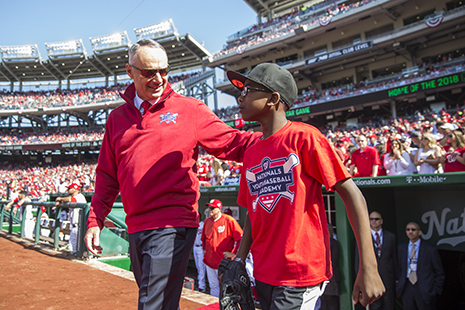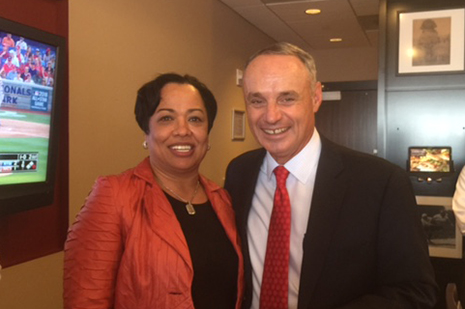 |
|||||||||
 |
|||||||||
Robert Manfred—a former labor and employment attorney in our Washington, DC office—was in DC for Major League Baseball’s Opening Day on April 6, 2015 and spent some time reconnecting with old friends in the Morgan Lewis suite. He had every right to crash the party, not only as a former Morgan Lewis lawyer, but also as the current Commissioner of Baseball. When Rob was elected the 10th commissioner in the game’s history in 2015, succeeding Bud Selig, he became the top official of “America’s Pastime.” Prior to taking the role, Rob was COO of MLB for two years and, before that, served for 15 years as executive vice president of labor relations, leading the negotiations that resulted in new collective bargaining agreements in 2002, 2006, and 2011. “I’ve spent the vast majority of my career in collective bargaining,” said Rob, “at MLB and Morgan Lewis. An important mentor was Harry Rissetto, and I hope his analytical skills rubbed off on me. Also, Bill Curtin and Chuck O’Connor. I’ve never seen more talented people at the bargaining table.” But one of Rob’s biggest challenges since becoming Commissioner has had nothing to do with hard-charging negotiating: it is getting kids on to fields in their communities as players and into Major League ballparks as fans. “We have a responsibility to pass on the game of baseball to the next generation,” said Rob, “as my parents did for me.” MLB is emphasizing its array of programs aimed at youth. The Baseball Tomorrow Fund—
Baseball is more accessible these days, Rob said, “because tickets cost less than any other professional sport. Even without the support of the Commissioner’s Office, individual teams are working hard at affordability. The Yankees have $5 bleacher seats. The Red Sox have a program that offers free and discounted tickets and a separate gate at Fenway Park.” Social media is an important component of building a new generation of fans, said Rob. “The key there is to encourage player activity. Fans want access to players more than what they see on the screen. At the All-Star Game, we will have social media stations set up during the Home Run Derby. Players will be able to tweet during the game. Our players are very tech savvy.” Rob described how MLB is deploying a new technology this season, known as Statcast, which follows players on the field, tracking how fast fielders are running, the route they are taking, and the speed of runners trying to steal a base. “All of this is designed to keep fan engagement during a broadcast,” he said. This focus on technology fits neatly into MLB’s larger business strategy. MLB Advanced Media is actually “one of the tech world’s top players,” according to CBS News, streaming baseball and entertainment content, including HBO, ESPN, the YES Network, and the W Network, on its own advanced streaming platform. In his downtime, Rob spends time with his wife, Colleen, and their four children. He enjoys golf and has made two holes-in-one. “I also like to go the ballpark,” he said. Any pickup baseball games? “Honestly,” said Rob. “I was one of the worst little leaguers of all time. I wasn’t very good.”
|
|||||||||
| www.morganlewis.com | Return to newsletter > | ||||||||

